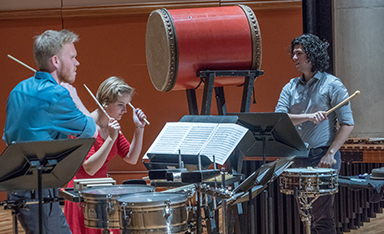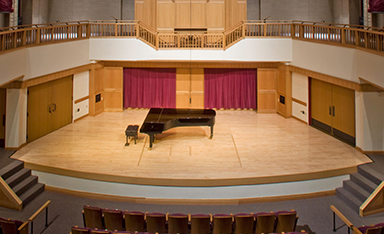DU Maestro Draws Inspiration From Father
Lawrence Golan’s father, Joseph, did not push him into music. But when Golan waves his conductor’s baton, there’s no doubt he’s channeling the spirit of the man who served as a Chicago Symphony Orchestra violinist for nearly five decades.
Golan, the orchestra and opera conductor at the University of Denver’s Lamont School of Music, references the song "The Leader of the Band" by Dan Fogelberg:
My life has been a poor attempt
To imitate the man
I'm just a living legacy
To the leader of the band
“Whenever I hear that song, I feel like it’s a biography about me,” Golan says. “My whole life has just been trying to make my dad proud, basically. To live up to his legacy.”
As it happens, Golan has built a considerable legacy of his own. In addition to his work at DU, he serves as director and conductor of the Denver Philharmonic, the Yakima Symphony Orchestra in Washington and the York Symphony Orchestra in Pennsylvania as well as principal guest conductor of the Bayerische Philharmonie in Munich, Germany. His contributions to the DU community were recently recognized with the 2021 Distinguished Scholar Award.
“All along [my father said], ‘I don't care what you do, as long as you do your best at it,’” Golan says.
Golan was 2 years old when his father first put a violin under his chin, but for most of his childhood, playing the violin wasn’t a major part of his life. He enjoyed sports, went to school and hung out with friends. He remembers practicing just 40 minutes a week, which was the time it took him to get to his violin lessons. But 11 years after first picking up the violin, classical music changed his life.
The summer of 1980 ignited Golan’s passion for music. That’s when he entered a concerto competition in his hometown of Highland Park, Illinois.
“I sort of scraped by and won the competition," he says.
Winning the competition granted him an opportunity to perform as a soloist with the orchestra. One passage, in particular, made him nervous. A minute into the piece he played harmonics, a whistling effect on the violin, his body shook but he survived.
"I walked off stage and I said, ‘This is for me,’” he remembers.
A few weeks later, Golan went to Interlochen, a performing arts camp in Michigan. There, his interest was piqued by an overheard audition for a recital solo. Through the cracked door of the audition room, he heard an 11-year-old’s performance, which was both beautiful and boisterous, intimidating and inspiring.
“I realized I want to do this, but I have a ton of catching up to do,” Golan says. “Instead of going into the audition, I went directly to the practice room. I practiced four hours that day, and the next day, and the next day and never looked back.”
Since then, Golan has spent tens of thousands of hours perfecting his craft as a professional violinist and conductor.
While his passion for the violin was ignited at 13, his enthusiasm for conducting came much later. Growing up in his father’s household, Golan jokes, being a conductor was like crossing to the dark side.
Golan explored conducting in college but solidified his love for the craft in Maine, where he served as concertmaster, the lead violinist, for the Portland Symphony. In addition to his performance responsibilities, he was tasked with heading up the string program at the University of Southern Maine. Suddenly, he was responsible for an orchestra.
“One thing they didn’t put in the job announcement: There was no University of Southern Maine orchestra. I had to create it,” he says. “As the orchestra got better year by year, I got more interested in conducting. [So I thought] I should probably learn something about conducting.”
After five years of splitting his time between conducting and performing, Golan decided he needed to choose between two loves. He chose conducting and ultimately the University of Denver, arriving on campus in 2001.
“If you want to be a concertmaster, you have to be practicing six hours a day,” he says. “There just weren’t enough hours in the day. So I made the decision to focus on conducting.”
Golan likens the role of a conductor to that of a chief executive officer at a company. The conductor is a music group’s most public-facing role. What’s more, a conductor is responsible for hiring decisions, vision for the orchestra’s programming and fundraising. Guiding a performance with a baton is just a small piece of the role.
In fact, Golan says, an orchestra could, depending on the piece, get through 80% or even 100% of the concert without a conductor. But if a conductor wasn’t involved at all, he explains, the orchestra would lack a decision maker to guide the interpretation.
“Who would choose the music? When you get to the rehearsal, that’s when you’d really have a problem. For any given musical decision, there would be 100 different opinions, all of them very good.”
His work outside of DU inspires his work at DU as a conductor, mentor and teacher.
“It’s not theoretical. It’s actual. It’s based on my professional performing life,” he says. “When I talk to my students about auditioning for a professional orchestra, it’s not something I read in a book. I’m just bringing my actual professional experience to the orchestra every day.”
But not just his experience. He also brings a sense of pride that he traces back to his time at Interlochen.
Weeks into his time at the camp, the Chicago Symphony Orchestra came to play. To get to the performance area, orchestra musicians had to walk through the main camp, where the crowd parted to make a path for them. Golan, a proud 13-year-old, walked alongside his father, carrying his violin.
“I don’t think I have ever been as proud in my life as walking next to him on the way to that concert,” he recalls.
From bow to baton, concert hall to classroom, Golan strives to embody his father’s legacy as leader of the band.


